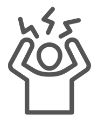Ambiguous loss
Click on the arrows below to learn more:
Avoidant behaviours
After exposure to a stressful event, those affected may try to avoid related emotions. This is how they cope with trauma. A person might immerse themselves in an activity, shut down, or engage in substance abuse to escape their feelings. These are avoidant behaviours. People affected by trauma might also respond by withdrawing from family and friends. They might spend more time alone and turn down opportunities to socialize. Withdrawal behaviours include irritability, reduced communication, and limited involvement in family life. When a family member is not really “there”, a source of emotional and practical support is lost for families.
Impacts of “not thereness” on families

When substance use, gambling, infidelity, or other vices are used to cope with trauma, SSOs can experience sadness, anger, jealousy, and/or depression. Poor communication can put the couple relationship at risk. Developing healthier strategies to manage trauma exposure can reduce the risks for families.

Over time, PSP families report that they have learned the signs of a ‘bad call.’ They know what to pay attention to and adjust their expectations. Sometimes these behaviours are isolated and manageable. Repeated behaviours that disrupt family life may require the support of a mental health professional.

When PSP withdraw from family life, family members, especially SSOs, are burdened with added responsibilities. More demands on any family member’s time can lead to role overload. The wellbeing of the family depends on timely and effective strategies that support healthy outcomes for all family members.

Both physical and emotional distance and the unpredictable involvement of a family member in family life strain relationships. Family members can experience feelings of anger and resentment, which can arise from lack of intimacy and trust. Early intervention is important to prevent growing problems.
Try: Skill-building Exercises
Need Something More?
Check out our self-directed Spouse or Significant Other Wellbeing Course.
References for this page (click to expand)
Beks, T. (2016). Walking on eggshells: the lived experience of partners of Veterans with PTSD. The Qualitative Report 21(4):645-660. https://doi.org/10.46743/2160-3715/2016.2269
Boss, P. (1992). Primacy of perception in family stress theory and measurement. Journal of Family Psychology, 6(2), 113-119. https://doi.org/10.1037/0893-3200.6.2.113
Dekel, R., Levinstein, Y., Siegel, A., Fridkin, S., & Svetlitzky, V. (2016). Secondary traumatization of partners of war veterans: the role of boundary ambiguity. Journal of Family Psychology, 30(1), 63-71. https://doi.org/10.1037/fam0000163
Miller, L. (2007). Police families: Stresses, syndromes, and solutions. The American Journal of Family Therapy, 35(1), 21-40. https://doi.org/10.1080/01926180600698541
Porter, K. L., & Henriksen, R. C. (2016). The phenomenological experience of first responder spouses. The Family Journal (Alexandria, Va.), 24(1), 44-51. https://doi.org/10.1177/1066480715615651
Regehr, C., Dimitropoulos, G., Bright, E., George, S., & Henderson, J. (2005). Behind the brotherhood: Rewards and challenges for wives of firefighters. Family Relations, 54(3), 423-435. https://doi.org/10.1111/j.1741-3729.2005.00328.x
Taft, C. T., Watkins, L. E., Stafford, J., Street, A. E., & Monson, C. M. (2011). Posttraumatic stress disorder and intimate relationship problems: a meta-analysis. Journal of Consulting and Clinical Psychology, 79(1), 22.
Waddell, E., Lawn, S., Roberts, L., Henderson, J., Venning, A., & Redpath, P. (2020). “Why do you stay?”: The lived‐experience of partners of Australian veterans and first responders with Posttraumatic Stress Disorder. Health & Social Care in the Community, 28(5), 1734-1742. https://doi.org/10.1111/hsc.12998
Watkins, S. L., Shannon, M. A., Hurtado, D. A., Shea, S. A., & Bowles, N. P. (2021). Interactions between home, work, and sleep among firefighters. American Journal of Industrial Medicine, 64(2), 137-148. https://doi.org/10.1002/ajim.23194
